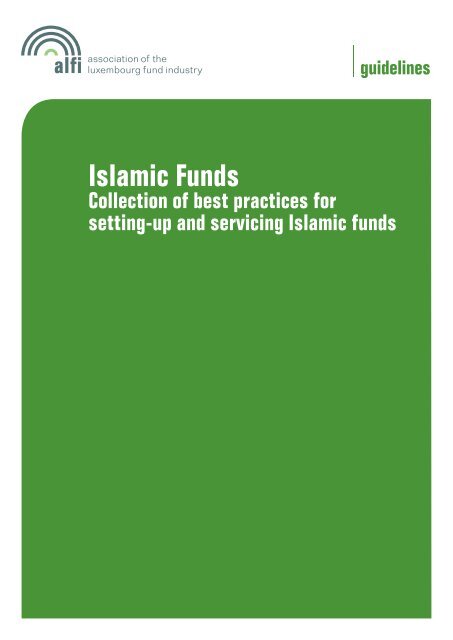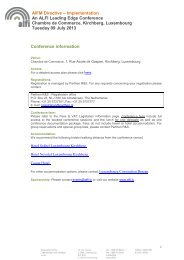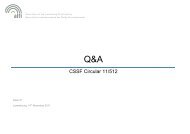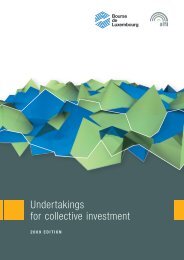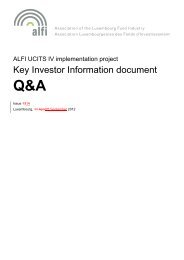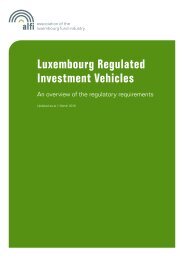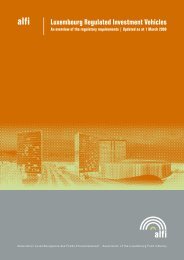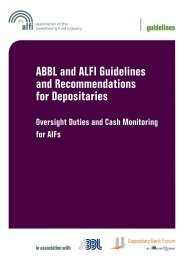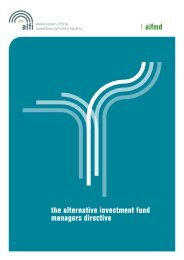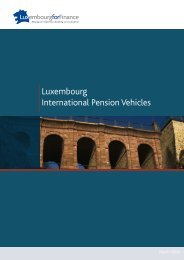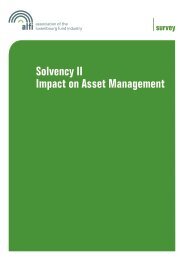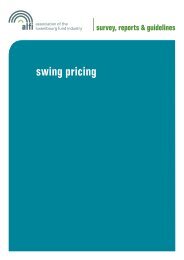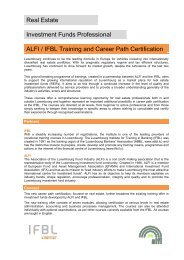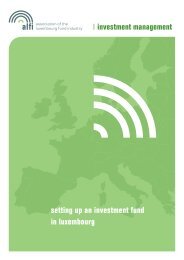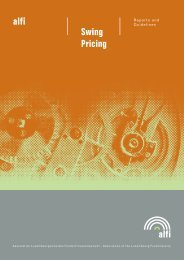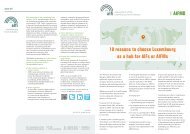Islamic Funds - Collection of best practices for setting-up and ... - Alfi
Islamic Funds - Collection of best practices for setting-up and ... - Alfi
Islamic Funds - Collection of best practices for setting-up and ... - Alfi
You also want an ePaper? Increase the reach of your titles
YUMPU automatically turns print PDFs into web optimized ePapers that Google loves.
guidelines<br />
<strong>Islamic</strong> <strong>Funds</strong><br />
<strong>Collection</strong> <strong>of</strong> <strong>best</strong> <strong>practices</strong> <strong>for</strong><br />
<strong>setting</strong>-<strong>up</strong> <strong>and</strong> servicing <strong>Islamic</strong> funds
table <strong>of</strong> contents<br />
CHAPTER I - BACKGROUND AND DEFINITIONS 2<br />
CHAPTER II - LEGAL SITUATION 4<br />
1. Law <strong>of</strong> 17 December 2010 <strong>and</strong> Law <strong>of</strong> 13 February 2007 5<br />
1.1. Applicable laws 5<br />
1.2. Investment strategies 5<br />
1.3. Discrepancies between Luxembourg law <strong>and</strong> Shariah principles 5<br />
1.4. Legal documentation 5<br />
2. Shariah or <strong>Islamic</strong> law 6<br />
2.1. <strong>Islamic</strong> funds 6<br />
2.2. Shariah screening 7<br />
2.3. Portfolio purification <strong>and</strong> Zakat 8<br />
3. Shariah board or Shariah advisor 8<br />
3.1. Definition 8<br />
3.2. Role <strong>and</strong> responsibilities 8<br />
3.3. Qualification <strong>and</strong> appointment 9<br />
4. Know your Customer (“KYC”) <strong>and</strong> Anti Money laundering procedures (“AML”) 9<br />
CHAPTER III - FUND SET-UP 10<br />
1. Prospectus 11<br />
2. Agreements 11<br />
3. Eligible asset classes 12<br />
CHAPTER IV - FUND ADMINISTRATION 13<br />
1. Accounting <strong>and</strong> valuation 14<br />
1.1. Valuation <strong>and</strong> pricing 14<br />
1.2. <strong>Islamic</strong> instruments 14<br />
1.3. Reporting 14<br />
1.4. Purification 14<br />
1.5. Transfer agency <strong>and</strong> <strong>Islamic</strong> calendar 15<br />
CHAPTER V - CUSTODY AND DEPOSITORY BANK 16<br />
1. Safekeeping <strong>and</strong> settlement 14<br />
2. Oversight (depository bank) <strong>and</strong> monitoring 17<br />
3. Banking <strong>and</strong> credit 17<br />
CHAPTER VI - APPENDICES 18<br />
Eligibility <strong>of</strong> Shariah compliant instruments in a UCITS context<br />
1
ackground <strong>and</strong> definitions<br />
chapter I
Background <strong>and</strong><br />
definitions<br />
Luxembourg is one <strong>of</strong> the largest domiciles <strong>and</strong><br />
servicing locations <strong>for</strong> international investment<br />
funds. There<strong>for</strong>e it is only natural that it has also<br />
been home to some <strong>of</strong> the first “<strong>Islamic</strong>” funds<br />
set <strong>up</strong> <strong>and</strong> serviced in a non-Muslim country.<br />
The first Luxembourg domiciled “<strong>Islamic</strong>”<br />
funds were launched in the early nineties.<br />
Since 2008, there has been a major global focus<br />
on this particular market segment <strong>and</strong> its<br />
potential <strong>for</strong> future development <strong>and</strong> growth.<br />
All major financial centres positioned<br />
themselves to various degrees in this market.<br />
In Luxembourg, ALFI decided, back in 2008 to<br />
create the ALFI Middle East <strong>and</strong> <strong>Islamic</strong> Finance<br />
working gro<strong>up</strong>, which rapidly became a very<br />
active gro<strong>up</strong>. This was a testimony to the<br />
interest shown by the industry in this market<br />
segment. Luxembourg <strong>for</strong> Finance was<br />
furthermore tasked by the Ministry <strong>of</strong> Finance<br />
to set <strong>up</strong> a dedicated task <strong>for</strong>ce to look at the<br />
possibilities Luxembourg could <strong>of</strong>fer to all areas<br />
<strong>of</strong> the financial sector including, funds, banking,<br />
insurance <strong>and</strong> stock exchange listings. Finally,<br />
the tax authorities issued two circulars in<br />
relation to <strong>Islamic</strong> financial products.<br />
“<strong>Islamic</strong>” funds or “Shariah” funds (hereinafter<br />
referred to <strong>Islamic</strong> funds) are fund vehicles,<br />
which follow the religious laws (hereinafter<br />
referred to as “Shariah”) laid down by the<br />
Holy Qu’ran. For believers, they may there<strong>for</strong>e<br />
be considered as funds with a “religious”<br />
connotation, whereby <strong>for</strong> non-Muslim<br />
investors, they frequently fall under the<br />
category <strong>of</strong> ethical or socially responsible funds.<br />
<strong>Islamic</strong> funds can follow the Shariah to various<br />
degrees, depending on the desires <strong>of</strong> the fund<br />
promoters <strong>and</strong> managers as well as the<br />
expectations <strong>of</strong> the target investor base. Such<br />
degrees may vary from strict adherence to the<br />
letter <strong>and</strong> the spirit <strong>of</strong> the Shariah (“Shariah<br />
compliant funds”) to a more simplistic approach<br />
<strong>of</strong> funds whose investment strategy is to follow<br />
an <strong>Islamic</strong> index (“Shariah friendly funds”).<br />
The aim <strong>of</strong> the present document is to give<br />
service providers in Luxembourg guidance as<br />
to how “<strong>Islamic</strong>” funds should be set <strong>up</strong> <strong>and</strong><br />
serviced. It should also allow fund managers<br />
aiming to set <strong>up</strong> a fund in Luxembourg to<br />
underst<strong>and</strong> how the Shariah principles will<br />
be applied from an operational perspective<br />
to their funds. The document should be<br />
considered as a collection <strong>of</strong> <strong>best</strong> <strong>practices</strong><br />
<strong>and</strong> is neither to be considered as a rule,<br />
nor a circular or a regulation.<br />
3
legal situation<br />
chapter II
1. Law <strong>of</strong><br />
17 December 2010 <strong>and</strong><br />
Law <strong>of</strong> 13 February 2007<br />
1.1. Applicable laws<br />
Shariah compliant undertakings <strong>for</strong> collective<br />
investment in transferable securities (“UCITS”)<br />
have, as a matter <strong>of</strong> principle, to be set <strong>up</strong> in<br />
accordance with the provisions <strong>of</strong> Part I <strong>of</strong> the<br />
law <strong>of</strong> 17 December 2010 on undertakings <strong>for</strong><br />
collective investments (the “2010 Law”).<br />
Other UCIs may be established under Part II <strong>of</strong><br />
the 2010 Law or the law <strong>of</strong> 13 February 2007<br />
(the “2007 Law”) on specialised investment<br />
funds (the “SIF”). Such UCIs must comply<br />
with the provisions <strong>of</strong> the 2010 Law <strong>and</strong> 2007<br />
Law <strong>and</strong> any other applicable laws <strong>and</strong><br />
regulations at all times during their existence.<br />
Particular attention should be paid to the<br />
eligibility <strong>of</strong> assets <strong>for</strong> UCITS created under the<br />
2010 Law. The same laws apply to all<br />
Luxembourg UCIs, whether in addition they<br />
follow specific rules (such as the respect<br />
<strong>of</strong> Islam, ethical or environmental principles,<br />
etc.) or not.<br />
1.2. Investment strategies<br />
The principles <strong>of</strong> Shariah in the area <strong>of</strong> <strong>Islamic</strong><br />
finance such as the prohibition <strong>of</strong> (i) interest <strong>for</strong><br />
the mere use <strong>of</strong> money, (ii) speculation or (iii)<br />
financing <strong>of</strong> a certain number <strong>of</strong> commodities or<br />
activities shall be reflected in the documentation<br />
<strong>of</strong> Shariah compliant UCIs as an investment<br />
strategy. Shariah compliant UCIs are thus<br />
comparable to ethical or socially responsible<br />
UCIs applying similar screening mechanisms<br />
on investments.<br />
Provisions relating to the screening <strong>of</strong> financial<br />
instruments <strong>for</strong> Shariah compliance <strong>and</strong><br />
specific advisory mechanisms have to be<br />
described in the documentation. H<strong>and</strong>ling <strong>of</strong><br />
potential deviation to such principles should<br />
also be described in the documentation.<br />
1.3. Discrepancies between Luxembourg<br />
Law <strong>and</strong> Shariah principles<br />
Luxembourg’s current legal framework <strong>of</strong>fers<br />
flexibility <strong>for</strong> the implementation <strong>of</strong> Shariah<br />
compliant investment strategies. It must however<br />
be noted that Shariah compliant UCIs must at<br />
all times comply with applicable Luxembourg<br />
laws <strong>and</strong> regulations <strong>and</strong> that in case <strong>of</strong><br />
discrepancies between Luxembourg laws <strong>and</strong><br />
regulations <strong>and</strong> Shariah principles, Luxembourg<br />
laws <strong>and</strong> regulations prevail.<br />
1.4. Legal documentation<br />
The documentation <strong>of</strong> Shariah compliant UCIs<br />
should clearly outline the governance as well<br />
as the duties <strong>and</strong> responsibilities <strong>of</strong> the service<br />
providers appointed by such fund or its<br />
management company in connection with<br />
Shariah compliance. It could furthermore be<br />
specified whether the relevant service providers<br />
are themselves set <strong>up</strong> as a Shariah compliant<br />
company or not.<br />
Although the service providers do not themselves<br />
need to be Shariah compliant, they must <strong>of</strong>fer the<br />
services without violating Shariah principles.<br />
Any references to interest payment or exposure<br />
to non-permitted activities shall be removed<br />
<strong>and</strong>/or excluded from the Shariah compliant<br />
UCIs documentation.<br />
The Shariah specific features should be outlined<br />
in the prospectus <strong>of</strong> the UCI with adequate risk<br />
warnings (if required) <strong>and</strong> specified in more<br />
detail in the relevant service provider agreements.<br />
5
legal situation<br />
2. Shariah or <strong>Islamic</strong><br />
law<br />
For the ease <strong>of</strong> underst<strong>and</strong>ing <strong>of</strong> the guidelines<br />
in this document, the following general<br />
definitions <strong>of</strong> principles are provided.<br />
Shariah or <strong>Islamic</strong> law governs the financial<br />
relationships involving entrepreneurial<br />
investment subject to the moral prohibition <strong>of</strong><br />
(i) interest earnings or usury (“riba”) <strong>and</strong><br />
money lending, (ii) sinful activity (“haram”)<br />
such as direct or indirect association with lines<br />
<strong>of</strong> business involving alcohol, pork products,<br />
firearms, tobacco, <strong>and</strong> adult entertainment,<br />
(iii) speculation, betting, <strong>and</strong> gambling<br />
(“maisir”), including the speculative trade or<br />
exchange <strong>of</strong> money <strong>for</strong> debt without an<br />
underlying asset transfer, (iv) the trading <strong>of</strong><br />
the same object between buyer <strong>and</strong> seller<br />
(“bay’ al inah”), as well as (v) preventable<br />
uncertainty (“gharar”) such as all financial<br />
derivative instruments, <strong>for</strong>warding contracts,<br />
<strong>and</strong> future agreements.<br />
As opposed to conventional finance, where<br />
interest represents the contractible cost <strong>for</strong><br />
funds tied to the amount <strong>of</strong> principal over a<br />
pre-specified lending period, the central tenet<br />
<strong>of</strong> the <strong>Islamic</strong> financial system is the<br />
prohibition <strong>of</strong> riba, whose literal meaning<br />
“an excess” is interpreted as any unjustifiable<br />
increase <strong>of</strong> capital whether through loans or<br />
sales. The general consensus among <strong>Islamic</strong><br />
scholars is that riba covers not only usury but<br />
also the charging <strong>of</strong> interest <strong>and</strong> any positive,<br />
fixed, predetermined rate <strong>of</strong> return that is<br />
guaranteed regardless <strong>of</strong> the per<strong>for</strong>mance <strong>of</strong> an<br />
investment. Since only interest-free <strong>for</strong>ms <strong>of</strong><br />
finance are considered permissible by the<br />
Shariah, financial relationships between<br />
financiers <strong>and</strong> borrowers are governed by<br />
shared business risk (<strong>and</strong> returns) from<br />
investment in lawful activities (“halal”).<br />
<strong>Islamic</strong> law does not object to payment <strong>for</strong> the<br />
use <strong>of</strong> an asset, <strong>and</strong> the earning <strong>of</strong> pr<strong>of</strong>its or<br />
returns from assets are indeed encouraged as<br />
long as both lender <strong>and</strong> borrower share the<br />
investment risk together.<br />
Pr<strong>of</strong>its must not be guaranteed based on<br />
assumption <strong>and</strong> can only accrue if the<br />
investment itself yields income. Any financial<br />
transaction under <strong>Islamic</strong> law assigns to<br />
investors clearly identifiable rights <strong>and</strong><br />
obligations <strong>for</strong> which they are entitled to<br />
receive commensurate return.<br />
Hence, <strong>Islamic</strong> finance literally “outlaws”<br />
capital-based investment gains without<br />
entrepreneurial risk. In light <strong>of</strong> these moral<br />
impediments to “passive” investment <strong>and</strong><br />
secured interest as <strong>for</strong>m <strong>of</strong> compensation,<br />
Shariah compliant lending in <strong>Islamic</strong> finance<br />
requires the replication <strong>of</strong> interest-bearing,<br />
conventional finance via more complex<br />
structural arrangements <strong>of</strong> contingent claims.<br />
2.1. <strong>Islamic</strong> <strong>Funds</strong><br />
<strong>Islamic</strong> funds are similar to conventional funds,<br />
to the extent that they share common<br />
objectives, such as pooling investors,<br />
preserving the capital <strong>and</strong> optimising the<br />
return. However, in contrast to conventional<br />
funds, <strong>Islamic</strong> funds must invest in con<strong>for</strong>mity<br />
with Shariah principles. To that extent, an<br />
<strong>Islamic</strong> fund has to comply with the following<br />
general obligations:<br />
QQ<br />
It is only allowed to carry out Shariah<br />
compliant investments;<br />
QQ<br />
Industry <strong>and</strong> financial screening must be<br />
per<strong>for</strong>med to ensure compliance with Shariah;<br />
QQ<br />
A Shariah board or Shariah advisor with at<br />
least one recognised Shariah scholar should<br />
be appointed;<br />
QQ<br />
Regular Shariah audits or reviews must be<br />
conducted either by the Shariah board, the<br />
Shariah advisor or by an external specialised<br />
<strong>and</strong> recognised third party;<br />
QQ<br />
In the event non Shariah compliant income is<br />
received by the fund, it must be purified by<br />
being donated to charitable institutions;<br />
QQ<br />
In no event, not even in case <strong>of</strong> failed trade<br />
<strong>and</strong>/or late payments, interest can be charged.<br />
Investment funds are defined by the<br />
Accounting <strong>and</strong> Auditing Organization <strong>for</strong><br />
<strong>Islamic</strong> Financial Institutions (AAOIFI) as:<br />
“<strong>Funds</strong> are investment vehicles, which are<br />
financially independent <strong>of</strong> the institutions that<br />
establish them. <strong>Funds</strong> take the <strong>for</strong>m <strong>of</strong> equal<br />
participating shares/units, which represent the<br />
shareholders’/unitholders’ share <strong>of</strong> the assets<br />
<strong>and</strong> entitlement to pr<strong>of</strong>its or losses. The funds<br />
are managed on the basis <strong>of</strong> either mudaraba<br />
or agency contract”.<br />
6
There are many types <strong>of</strong> <strong>Islamic</strong> funds such as<br />
<strong>Islamic</strong> index funds, Shariah private equity<br />
funds, Sukuk funds, Shariah compliant hedge<br />
funds, <strong>Islamic</strong> equity funds, Shariah compliant<br />
ETFs, <strong>Islamic</strong> REITs, murabaha funds, <strong>Islamic</strong><br />
commodity funds <strong>and</strong> ijara funds.<br />
It is in principle possible to set <strong>up</strong> <strong>Islamic</strong><br />
sub-funds in a Luxembourg domiciled<br />
conventional umbrella fund. However, in such<br />
a case, it must be ensured that all Shariah<br />
principles apply on sub-fund level <strong>and</strong> that the<br />
fund is set-<strong>up</strong> with a clear segregation <strong>of</strong><br />
responsibilities on sub-fund level. Investors<br />
into the conventional sub-funds <strong>of</strong> such an<br />
umbrella fund may not be impacted directly<br />
or indirectly by the Shariah principles.<br />
2.2. Shariah screening<br />
When an <strong>Islamic</strong> fund is contemplating to carry<br />
out an investment in equity, screening has to be<br />
done to ensure that the underlying company’s<br />
level <strong>of</strong> Shariah compliance is acceptable.<br />
Screening is essentially applied at two levels:<br />
(i) the business activity <strong>and</strong> (ii) the financial structure.<br />
QQ<br />
Any other type <strong>of</strong> company that might be<br />
prohibited by the Shariah board.<br />
Although some business activities are very easy<br />
to monitor, others are more difficult to determine<br />
precisely. Many halal businesses such as grocery<br />
stores, s<strong>up</strong>ermarkets, airlines, hotels <strong>and</strong><br />
restaurants may derive part <strong>of</strong> their pr<strong>of</strong>its from<br />
prohibited activities such as selling alcohol.<br />
In these cases, <strong>Islamic</strong> scholars generally allow<br />
<strong>Islamic</strong> funds to invest in such halal businesses<br />
on condition that the income derived from that<br />
prohibited activity is no more than 5% <strong>of</strong> the<br />
companies' total income <strong>and</strong> that any<br />
dividends received as a result <strong>of</strong> investing in<br />
these companies are purified. The purification<br />
principle is relatively straight-<strong>for</strong>ward <strong>and</strong><br />
involves donating to a charitable organisation<br />
5% <strong>of</strong> the dividends received from that<br />
particular investee company as it is deemed to<br />
be attributed to the non Shariah compliant<br />
activities (this percentage may vary depending<br />
on the opinion <strong>of</strong> the specific scholars).<br />
It is important to remember that screening is not<br />
only applied at the time the investment decision<br />
is taken but also after the investment has taken<br />
place, on a regular basis, to ensure that the<br />
target companies are still Shariah compliant.<br />
The business activity screening aims to exclude<br />
investments in companies dealing with haram<br />
activities/products such as:<br />
QQ<br />
Companies that produce/sell/trade/slaughter/<br />
distribute pork-related products;<br />
QQ<br />
Companies that promote pornography or<br />
adult entertainment in any <strong>for</strong>m;<br />
QQ<br />
Companies whose activity involves gambling,<br />
such as casinos, lotteries, betting companies,<br />
Internet gambling;<br />
QQ<br />
Companies active in the conventional<br />
banking <strong>and</strong> insurance;<br />
QQ<br />
Companies primarily active in the pure<br />
entertainment business, such as movies,<br />
theatre, cinema;<br />
QQ<br />
Companies active in the defence or weapons<br />
industry;<br />
QQ<br />
Companies active in the tobacco or alcohol<br />
business (this includes producers, sellers <strong>and</strong><br />
distributors); <strong>and</strong><br />
Most <strong>Islamic</strong> scholars agree on the fact that it<br />
is very difficult to find investee companies that<br />
are completely Shariah compliant with no<br />
conventional debt <strong>and</strong> no interests on their<br />
balance sheet. There<strong>for</strong>e, the <strong>Islamic</strong> finance<br />
community has developed three general<br />
cumulative tolerance criteria to govern Shariah<br />
compliant equity investments. There are a few<br />
slightly different versions <strong>of</strong> these criteria <strong>and</strong><br />
the following is one example.<br />
The first criteria aim at restricting the amount <strong>of</strong><br />
interest-based debt in the balance sheet <strong>of</strong> target<br />
companies. To that extent, companies whose<br />
interest-based debt divided by their 12-month<br />
average market capitalisation exceeds or is equal<br />
to 33% will not be considered as Shariah<br />
compliant <strong>and</strong> are there<strong>for</strong>e prohibited.<br />
The second criteria aim at restricting investment<br />
in companies with excessive accounts receivable.<br />
Indeed, companies whose accounts receivable<br />
divided by their 12-month average market<br />
capitalisation exceeds or is equal to 33% will<br />
not be considered as Shariah compliant <strong>and</strong> are<br />
there<strong>for</strong>e prohibited.<br />
7
legal situation<br />
The third criteria aim at restricting investment<br />
in companies with excessive amounts <strong>of</strong><br />
interest-bearing securities <strong>and</strong> cash. To that<br />
extent, companies whose total cash <strong>and</strong><br />
interest-bearing securities divided by their<br />
12-month average market capitalisation<br />
exceeds or is equal to 33% will not be<br />
considered as Shariah compliant <strong>and</strong> are<br />
there<strong>for</strong>e prohibited.<br />
To facilitate the investment decision <strong>for</strong> <strong>Islamic</strong><br />
fund managers, many index providers have<br />
launched Shariah compliant versions <strong>of</strong> their<br />
indexes (e.g. Nasdaq, MSCI, Dow Jones, FTSE,<br />
S&P…). This has been achieved by implementing<br />
a technology, which automatically removes<br />
from the conventional index all companies that<br />
fail to comply with business activity <strong>and</strong><br />
financial screenings. It is worth noting that the<br />
screening criteria can be different depending on<br />
the index. There<strong>for</strong>e, depending on the Shariah<br />
compliance sensitivity <strong>of</strong> their investors,<br />
<strong>Islamic</strong> funds might decide to invest in one<br />
<strong>Islamic</strong> index instead <strong>of</strong> another.<br />
2.3. Portfolio purification <strong>and</strong> Zakat<br />
Zakat (“Zakat”) <strong>and</strong> purification are two<br />
entirely different, though not unrelated,<br />
matters. The literal meaning <strong>of</strong> Zakat is<br />
purification but in reality refers to an <strong>Islamic</strong><br />
tax - one <strong>of</strong> the 5 pillars <strong>of</strong> Islam. The meaning<br />
<strong>of</strong> purification in portfolio management is the<br />
cleansing <strong>of</strong> an investment portfolio <strong>of</strong> impure<br />
elements. Such “impure” earnings must be<br />
quantified <strong>and</strong> then purified.<br />
3. Shariah Board or<br />
Shariah advisor<br />
3.1. Definition<br />
The Shariah Board (the “Shariah board”) can<br />
be defined as a collegial body composed <strong>of</strong><br />
jurists hired by a public or private institution<br />
to ensure compliance <strong>of</strong> transactions with legal<br />
<strong>and</strong> ethical Islam principles (Ould Sass, 2009).<br />
In the governance structure <strong>of</strong> an investment<br />
fund, the Shariah board can be thought <strong>of</strong> as a<br />
committee <strong>of</strong> Muslim Scholars (the “scholars”),<br />
acting as an advisory board to the fund.<br />
The Shariah board will issue a certification<br />
(the “fatwa”), i.e. a confirmation that the fund<br />
structure <strong>and</strong> its investment policy are set <strong>up</strong><br />
with prescribed Shariah principles. Luxemburg<br />
domiciled funds may also opt to appoint a<br />
single individual who wil be the Shariah<br />
advisor (the “Shariah advisor”) to the fund.<br />
Shariah Boards <strong>for</strong> different companies will<br />
usually have different Scholars. However, the<br />
Shariah board consists <strong>of</strong> those that are<br />
knowledgeable in Shariah principles, either<br />
from economic, legal or religious st<strong>and</strong>points<br />
<strong>and</strong> when working in the finance field, they<br />
will usually have Fiqh-al-Muamalat knowledge<br />
<strong>and</strong> experience. They will also usually be<br />
members <strong>of</strong> either AAOIFI (Accounting <strong>and</strong><br />
Auditing <strong>of</strong> <strong>Islamic</strong> Financial Institutions based<br />
in Bahrain) or IFSB (<strong>Islamic</strong> Financial Services<br />
Board based in Malaysia).<br />
3.2. Role <strong>and</strong> responsibilities<br />
The historical functions <strong>of</strong> a Shariah board or<br />
a Shariah advisor are in the ethical-religious<br />
legitimisation <strong>and</strong> the issuance <strong>of</strong> fatwas<br />
certifying the <strong>Islamic</strong> financial products.<br />
The Shariah board’s or the Shariah advisor’s<br />
role consists generally in validating or rejecting<br />
target investments that are submitted to its<br />
perusal <strong>and</strong> expertise, as well as contributing<br />
to the design <strong>of</strong> new solutions while trying to<br />
help executives make the right choice in terms<br />
<strong>of</strong> products. Those decisions can not be in<br />
contradiction with the provisions <strong>of</strong> the<br />
Luxembourg law.<br />
In Luxembourg company law as well as in the<br />
laws on investment funds, there are no<br />
provisions in relation to the responsibility <strong>of</strong> a<br />
Shariah board or a Shariah advisor. As such<br />
<strong>and</strong> unless the Shariah advisor is also a<br />
member <strong>of</strong> the Board <strong>of</strong> directors <strong>of</strong> the fund<br />
or the management company, the specific<br />
responsibility is not covered by Luxembourg<br />
law, but only on the basis <strong>of</strong> contractual<br />
arrangements between the Fund or the<br />
management company <strong>and</strong> the Shariah board<br />
or Shariah advisor.<br />
8
3.3. Qualification <strong>and</strong> appointment<br />
From a pure legal perspective, there is no<br />
requirement <strong>for</strong> any Luxembourg domiciled<br />
<strong>Islamic</strong> fund to establish or have the approval<br />
<strong>of</strong> a Shariah board. Furthermore, when a fund<br />
promoter envisages to establish a Shariah<br />
board or appoint a Shariah advisor, neither the<br />
laws or regulations nor the Commission de<br />
Surveillance du Secteur Financier (the “CSSF”)<br />
requires specific conditions to this regard.<br />
Unless, the Shariah advisor is also a member <strong>of</strong><br />
the Board <strong>of</strong> directors <strong>of</strong> the fund or the<br />
management company, the appointment is not<br />
subject to individual approval by the CSSF. The<br />
CSSF currently considers the Shariah board as<br />
an advisory committee or the Shariah advisor<br />
as an individual advisor to the fund.<br />
Some suggest that the qualifications <strong>of</strong> members<br />
<strong>of</strong> Shariah boards are modeled to those<br />
previously required <strong>for</strong> the exercise <strong>of</strong> ijtihad.<br />
As such, member <strong>of</strong> a Shariah board should be<br />
a lawyer who has the competence required <strong>for</strong><br />
ijtihad practice 1 . This competence is subject to<br />
the need to fulfill very specific conditions. They<br />
can be summarised in six conditions <strong>for</strong> which<br />
there is a broad consensus among scholars:<br />
QQ<br />
Good knowledge <strong>of</strong> the principles <strong>of</strong> <strong>Islamic</strong> law;<br />
QQ<br />
Sufficient knowledge <strong>of</strong> Arabic;<br />
QQ<br />
Master the methodology <strong>of</strong> reasoning concerning<br />
the interpretation <strong>of</strong> the founding texts i.e. the<br />
Qu’ran <strong>and</strong> Hadith duly authenticated;<br />
QQ<br />
Well educated in terms <strong>of</strong> st<strong>and</strong>ards <strong>and</strong><br />
rules <strong>of</strong> caselaw;<br />
QQ<br />
Sufficient knowledge <strong>of</strong> the issues consensus 2 .<br />
QQ<br />
Approval <strong>of</strong> his peers as a scholar<br />
particularly in terms <strong>of</strong> Fiqh.<br />
Guidelines <strong>and</strong> st<strong>and</strong>ards concerning the<br />
Shariah governance system are further<br />
described by the two different authorities<br />
mentioned be<strong>for</strong>e: AAIOFI <strong>and</strong> IFSB.<br />
In practice, the appointment <strong>of</strong> the Shariah<br />
board or Shariah advisor is based on a decision<br />
<strong>of</strong> the board <strong>of</strong> directors or the management<br />
company <strong>of</strong> the fund.<br />
According to the st<strong>and</strong>ards proposed by the<br />
AAOIFI, in case <strong>of</strong> appointment <strong>of</strong> a Shariah<br />
board as opposed to a single Shariah advisor, a<br />
Shariah board should consist <strong>of</strong> a minimum <strong>of</strong><br />
three members <strong>and</strong> should not include among<br />
its members a director <strong>of</strong> the institution or a<br />
shareholder having a significative influence.<br />
1 M. Al-Baali, “Al-Fiqh al-li Madkhal Bounouk-Al-Islamiya,”<br />
book published in Arabic by the <strong>for</strong>mer Union <strong>of</strong> <strong>Islamic</strong><br />
Banks, Cairo, 1983 p.155.<br />
2 Due to the fact that the doctrinal divergence marks relatively<br />
the <strong>Islamic</strong> law, knowledge <strong>of</strong> the issues <strong>of</strong> consensus is <strong>of</strong>ten<br />
referred to as critical by the oulémas. It should be noted that<br />
in Fiqh applicable in <strong>Islamic</strong> finance consensual fatwas cover<br />
nearly 90% <strong>of</strong> cases according Sheikh Nizam Yaqubi, president<br />
<strong>of</strong> several SB <strong>of</strong> banks <strong>and</strong> <strong>Islamic</strong> financial institutions.<br />
4. Know your Customer<br />
(“KYC”) <strong>and</strong> Anti<br />
Money laundering<br />
procedures (“AML”)<br />
The general laws <strong>and</strong> regulations on KYC<br />
<strong>and</strong> AML as well as the rules relating to<br />
counterfeiting <strong>of</strong> financing <strong>of</strong> terrorism<br />
applicable to Luxembourg domiciled<br />
investment funds apply to <strong>Islamic</strong> funds in<br />
the same manner than to conventional funds.<br />
Investors into <strong>Islamic</strong> funds do not need to be<br />
<strong>of</strong> Muslim origin <strong>and</strong> Luxembourg domiciled<br />
<strong>Islamic</strong> funds are open to Muslim <strong>and</strong> non-<br />
Muslim investors. However restrictions might<br />
apply if applications <strong>for</strong> subscriptions would<br />
be submitted from institutions or organisations<br />
engaged in a non Shariah compliant activity.<br />
In principle, there is no requirement to verify<br />
if the money used to pay <strong>for</strong> subscription is<br />
derived from a Shariah compliant activity.<br />
9
fund set–<strong>up</strong><br />
chapter III
Sales documents <strong>of</strong> Luxembourg funds may be<br />
adapted to some specificities <strong>and</strong> requirements <strong>of</strong><br />
Shariah. However there are no strict guidelines<br />
neither from Luxembourg s<strong>up</strong>ervisory authority<br />
nor from any other public or private entity as to<br />
the content <strong>of</strong> the documents required <strong>for</strong> the set<br />
<strong>up</strong> <strong>of</strong> an <strong>Islamic</strong> fund.<br />
Similarly, there is no Luxembourg label or<br />
certificate which would confirm the Shariah<br />
compliant character <strong>of</strong> a fund based on the<br />
content <strong>of</strong> its documents.<br />
The below is consequently based on st<strong>and</strong>ard<br />
<strong>best</strong> practice.<br />
1. Prospectus<br />
There are no specific legal requirements<br />
regarding the drafting <strong>of</strong> the prospectus <strong>of</strong><br />
an <strong>Islamic</strong> under Luxembourg law.<br />
However, it is a common practice that <strong>Islamic</strong><br />
funds insert specific provisions in the<br />
prospectus in line with Shariah principles<br />
<strong>and</strong> which provisions can be summarized<br />
as follows:<br />
Investment policy <strong>and</strong> restrictions<br />
QQ<br />
General description <strong>of</strong> the investment policy<br />
in relation to Shariah principles, including<br />
definitions <strong>of</strong> terminology used;<br />
QQ<br />
Ban <strong>of</strong> investments in any interest bearing<br />
assets/debt instruments <strong>and</strong> as the case may<br />
be confirmation that assets will be kept on<br />
non-interest bearing accounts;<br />
QQ<br />
Ban on futures or <strong>for</strong>ward contracts,<br />
derivative instruments <strong>and</strong> short sales;<br />
QQ<br />
Prohibition <strong>of</strong> investment into haram activities<br />
(gambling, alcohol, production or sale <strong>of</strong> pork<br />
products, tobacco, arms manufacturing…);<br />
QQ<br />
Description <strong>of</strong> procedure applying to the sale<br />
<strong>of</strong> assets which become non-compliant<br />
(see also “Agreements” below);<br />
Structure<br />
QQ<br />
Shariah Board (appointment, members, role,<br />
competences, practical details <strong>of</strong> the functioning,<br />
remuneration, relation with board/management<br />
company) should be described in detail;<br />
QQ<br />
In<strong>for</strong>mation as to separate Shariah audit,<br />
if any should be given.<br />
Pricing <strong>and</strong> valuation<br />
QQ<br />
Adequate disclosure <strong>of</strong> specific pricing <strong>and</strong><br />
valuation techniques applicable to <strong>Islamic</strong><br />
assets should be made;<br />
Purification<br />
QQ<br />
Cleansing process <strong>of</strong> impure cash or dividends<br />
should be described in full <strong>and</strong> the charity(ies)<br />
potentially benefitting from the purification<br />
process should be named.<br />
All the provisions inserted in the prospectus must<br />
comply with Luxembourg law. The in<strong>for</strong>mation<br />
should be presented in a clear <strong>and</strong> easy to<br />
underst<strong>and</strong> manner <strong>for</strong> the investors. In addition,<br />
the name <strong>of</strong> the fund should make a reference to<br />
its Shariah compliant investment policy.<br />
2. Agreements<br />
Agreements signed between an <strong>Islamic</strong> fund or<br />
its management company <strong>and</strong> its service<br />
providers are similar to those used with respect<br />
to Luxembourg conventional funds.<br />
In a contractual relationship, the parties are<br />
always free to submit their relations to Shariah<br />
principles, as long as such additional clauses do<br />
not contravene with rules <strong>of</strong> Luxembourg<br />
public order.<br />
Due to the nature <strong>of</strong> the <strong>Islamic</strong> funds, some<br />
particular points might need to be mentioned<br />
where applicable in the various agreements:<br />
QQ<br />
The agreement with the central administration<br />
agent or the investment manager should<br />
describe the responsibility <strong>and</strong> methodology<br />
<strong>of</strong> the portfolio screening <strong>for</strong> compliance with<br />
Shariah principles;<br />
QQ<br />
The management company services<br />
agreement should describe the responsibility<br />
<strong>of</strong> the company <strong>for</strong> the day-to-day<br />
management <strong>of</strong> the affairs <strong>of</strong> the <strong>Islamic</strong><br />
fund in accordance with the prospectus <strong>and</strong><br />
subject to the policies <strong>and</strong> guidelines issued<br />
from time to time by the board <strong>of</strong> directors<br />
<strong>up</strong>on advice from the Shariah board or<br />
Shariah advisor;<br />
11
fund set–<strong>up</strong><br />
QQ<br />
The investment management agreement<br />
should provide <strong>for</strong> the obligation <strong>for</strong> the<br />
investment manager to take all reasonable<br />
steps to sell investments made in assets which<br />
cease to be in compliance with the <strong>Islamic</strong><br />
investment guidelines, as soon as reasonably<br />
practicable but, always in the <strong>best</strong> interests <strong>of</strong><br />
the investors. The definition <strong>of</strong> ‘reasonable<br />
delay’ might be included. As a general<br />
guideline, market practice considers 3 months<br />
as a reasonable delay. Illiquid assets however<br />
might be subject to longer delays. Reference<br />
thereto may, as the case may be, also be<br />
provided in the prospectus <strong>of</strong> the fund;<br />
QQ<br />
The custody agreement should specify that the<br />
custodian, in its capacity as depository is not<br />
responsible <strong>for</strong> the screening or checking <strong>of</strong><br />
compliance with Shariah law <strong>and</strong>/or <strong>Islamic</strong><br />
investment guidelines, unless the custodian<br />
specifically <strong>of</strong>fers this service <strong>and</strong> accepts such<br />
responsibility. In the latter case, the custody<br />
agreement should include specific clauses<br />
relating to this service. Furthermore, should<br />
the fund opt to settle on actual basis, reference<br />
hereto should be made in the agreement (see<br />
“Custody <strong>and</strong> depository bank” hereafter).<br />
Finally, penalties <strong>and</strong> fees in case <strong>of</strong> failed<br />
trades or late settlement should be agreed <strong>and</strong><br />
included in the agreement as no interest may<br />
be charged;<br />
QQ<br />
The custodian bank cash account opening<br />
<strong>for</strong>ms should not contain any reference to<br />
interest, neither positive nor negative.<br />
Furthermore, the terms <strong>and</strong> conditions should<br />
describe the mechanism used to prevent<br />
overdraft as well as penalties in case <strong>of</strong> breach<br />
<strong>of</strong> the terms <strong>and</strong> conditions.<br />
All agreements should be expressly clear on the<br />
applicable law <strong>and</strong> competent jurisdictions in<br />
order to avoid any conflict with Shariah law in<br />
case such law is prevailing in another jurisdiction.<br />
3. Eligible asset classes<br />
Shariah compliant vehicles provide <strong>for</strong> special<br />
features, such as prohibition <strong>of</strong> investment into<br />
haram activities, which can easily be integrated<br />
into Luxembourg domiciled funds.<br />
Full description <strong>of</strong> investment policy <strong>and</strong><br />
investment restrictions need to be included in the<br />
prospectus.<br />
The attached table may be used as a guideline<br />
to highlight the definitions, characteristics <strong>and</strong><br />
potential UCITS qualification <strong>of</strong> the main<br />
investment types. This in<strong>for</strong>mation is not<br />
to be considered as legal advice. It is also<br />
recommended that each individual asset be<br />
assessed based on its contractual documentation<br />
in order to assure UCITS eligibility.<br />
The eligibility <strong>of</strong> specific Shariah compliant<br />
asset classes, which are more <strong>and</strong> more used in<br />
addition to traditional equity investments, also<br />
needs to be assessed, albeit primarily in<br />
relation to UCITS funds. Some Shariah<br />
compliant instruments such as sukuk are<br />
structurally different from conventional<br />
investments <strong>and</strong> it is there<strong>for</strong>e not immediately<br />
obvious whether they are eligible assets or not.<br />
Sukuk <strong>for</strong> instance can be asset-based or<br />
asset-backed (i.e. granting access to the<br />
underlying asset or not). These contractual<br />
differences mean that some structures may be<br />
UCITS compliant whilst others might, under<br />
certain circumstances, leave the investment fund<br />
with a physical asset, thereby not being eligible.<br />
Besides the eligibility <strong>of</strong> assets per se, the fund<br />
manager will need to pay particular attention to<br />
other Shariah principles such as riba or gharar.<br />
The exclusion <strong>of</strong> riba i.e. the balance between<br />
income gained <strong>and</strong> risks taken <strong>and</strong> the<br />
prohibition <strong>of</strong> interests <strong>and</strong> unjust enrichment<br />
may also impact the eligible assets <strong>and</strong> can <strong>for</strong><br />
instance be ensured by <strong>setting</strong> defined ratios<br />
<strong>for</strong> illiquid assets <strong>and</strong> <strong>for</strong>eseeing in the fund’s<br />
documentation that no interest can be levied.<br />
Furthermore, the prohibition <strong>of</strong> gharar, i.e. the<br />
prohibition <strong>of</strong> speculation <strong>and</strong> uncertainty,<br />
which prescribes that the elements <strong>of</strong> a<br />
contract must be pre-determined may be<br />
achieved through express additional investment<br />
restrictions included in the sales documents <strong>of</strong><br />
the fund, thereby limiting the eligible assets.<br />
12
Fund administration<br />
chapter IV
fund administration<br />
1. Accounting <strong>and</strong><br />
valuation<br />
1.1. Valuation <strong>and</strong> pricing<br />
As a general rule, all principles laid down by<br />
Luxembourg law, regulations <strong>and</strong> <strong>best</strong> practice<br />
in relation to fund valuation <strong>and</strong> pricing <strong>of</strong><br />
Luxembourg domiciled funds apply. In relation<br />
to pricing <strong>of</strong> <strong>Islamic</strong> assets, the price provider<br />
should have a high level <strong>of</strong> expertise in assets<br />
<strong>and</strong> markets being assessed.<br />
The large market data providers have record<br />
prices <strong>for</strong> most sukuks. But, <strong>for</strong> other<br />
instruments, prices may only be available<br />
through internal modelling or brokers.<br />
The governing body <strong>of</strong> the <strong>Islamic</strong> investment<br />
fund should make sure that the pricing system<br />
is robust <strong>and</strong> will produce accurate results.<br />
Whilst this is valid <strong>for</strong> all funds, also<br />
conventional funds, it must be recognised that<br />
<strong>Islamic</strong> funds hold non-conventional assets <strong>and</strong><br />
that the pricing <strong>of</strong> these assets may require<br />
s<strong>up</strong>port from specialised price providers. In<br />
those cases, it is advisable that the board <strong>of</strong><br />
directors or the management company <strong>of</strong> the<br />
fund validates such prices.<br />
Pricing models should be subject to periodic<br />
reviews <strong>and</strong> these reviews should be carried out<br />
at least annually.<br />
The fund’s prospectus should clearly state <strong>and</strong><br />
provide detail on the funds pricing policy <strong>and</strong><br />
the preferred price providers.<br />
1.2. <strong>Islamic</strong> instruments<br />
There is a broad range <strong>of</strong> <strong>Islamic</strong> assets <strong>and</strong><br />
instruments. While the major categories <strong>of</strong> <strong>Islamic</strong><br />
assets <strong>and</strong> financial instruments are conceptually<br />
simple, they may become complicated in practice<br />
when issuers <strong>of</strong> such instruments combine<br />
aspects <strong>of</strong> two or more types <strong>of</strong> instruments.<br />
As an illustration <strong>of</strong> this, AAOIFI issued<br />
st<strong>and</strong>ards <strong>for</strong> 14 different types <strong>of</strong> Sukuk.<br />
ALFI has considered the UCITS eligibility <strong>of</strong> a<br />
wide range <strong>of</strong> <strong>Islamic</strong> instruments as detailed<br />
on pages 18-21.<br />
This impacts how the securities are set <strong>up</strong> in<br />
the fund administrator’s accounting system <strong>and</strong><br />
how the instruments should be accounted <strong>for</strong>.<br />
<strong>Islamic</strong> instruments should be set <strong>up</strong> as distinct<br />
assets. As the pr<strong>of</strong>it accruals are different from<br />
other asset types, new accrual classifications<br />
also have to be created. The general ledger<br />
reports should be adapted to reflect the pr<strong>of</strong>its<br />
<strong>and</strong> losses from <strong>Islamic</strong> instruments such as<br />
sukuk, murabaha <strong>and</strong> wakala. All mentions in<br />
relation to “interest” should be removed <strong>and</strong><br />
replaced by “pr<strong>of</strong>it” or “loss”.<br />
The accounting treatment <strong>of</strong> <strong>Islamic</strong> products<br />
should be disclosed in the fund’s prospectus.<br />
The trade capture process may or may not be<br />
fully automated, depending on the instrument<br />
type. Generally, when an instrument such as<br />
sukuk are custodised, then the transaction is<br />
h<strong>and</strong>led in a straight-through process in the<br />
same manner as a conventional bond.<br />
1.3. Reporting<br />
Luxembourg financial <strong>and</strong> all other regulatory<br />
reporting st<strong>and</strong>ards have to be fulfilled.<br />
The fund manager <strong>and</strong> the Shariah board<br />
may decide additional reporting according<br />
to AAOIFI guidelines.<br />
<strong>Islamic</strong> funds do not recognise interest, neither<br />
debit nor credit. Reports can there<strong>for</strong>e not<br />
mention interest. As such administrators have<br />
to adjust systems or implement “work-around”<br />
procedures to report equivalent income or<br />
expenditure in reports.<br />
1.4. Purification<br />
Non-permissible income can be “purified”.<br />
Some funds simply pay a flat purification<br />
amount without determining the nonpermissible<br />
income. For other funds, the fund<br />
administrator calculates the non-permissible<br />
income in great detail, <strong>for</strong> example the nonpermissible<br />
portion <strong>of</strong> each dividend earned,<br />
<strong>and</strong> the purification amount that entails.<br />
Some index providers calculate non-permissible<br />
income factors. These factors can then<br />
systematically be applied to the dividend earned.<br />
It is generally the responsibility <strong>of</strong> the Shariah<br />
board or the Shariah advisor to ensure that all<br />
impure income is calculated by the fund, <strong>and</strong><br />
that a corresponding percentage is deducted<br />
from the earnings, passed on to investors<br />
thereby ensuring that these are free <strong>of</strong><br />
impurities <strong>and</strong> completely halal. The<br />
methodologies <strong>for</strong> calculation may differ from<br />
fund to fund, or from one Shariah board to<br />
14
another, where scholars, <strong>for</strong> whatever reasons,<br />
have preferences in the matter. With the advice<br />
<strong>and</strong> counsel <strong>of</strong> the fund's Shariah board, these<br />
amounts may be distributed among suitable<br />
charities, or a charitable fund may be<br />
established <strong>for</strong> the purpose; again, under the<br />
s<strong>up</strong>ervision <strong>of</strong> the Shariah scholars.<br />
All charitable payments should be screened<br />
against blacklists applicable to the domicile <strong>of</strong><br />
the fund to ensure that anti money laundering<br />
<strong>and</strong> know your customer obligations are thus<br />
maintained. To reduce risk in this area, the<br />
beneficial charities should be mentioned in the<br />
fund's prospectus. In addition, <strong>and</strong> be<strong>for</strong>e any<br />
payment is made, the identity <strong>of</strong> the<br />
beneficiaries should be checked in accordance<br />
with CSSF circulars relating to potential<br />
business relationships with terrorist regimes.<br />
The fund administrator should in principle<br />
always publish the fund’s net asset value net<br />
<strong>of</strong> purification adjustments. Where a fixed<br />
percentage is applied to calculate the impure<br />
dividend amount, that dividend is accrued<br />
on a monthly or quarterly basis <strong>and</strong> paid to<br />
the selected charity at the end <strong>of</strong> the agreed<br />
period – usually every quarter.<br />
The matter <strong>of</strong> Zakat is complicated by any<br />
number <strong>of</strong> factors that lie outside the control<br />
<strong>of</strong> the <strong>Islamic</strong> fund, the person’s income, family<br />
matters, health, etc. Since these factors are<br />
particular to the circumstances <strong>of</strong> each<br />
investor, the matter <strong>of</strong> Zakat is very <strong>of</strong>ten left<br />
to the investors themselves.<br />
<strong>Islamic</strong> funds established under Luxembourg<br />
law are open <strong>for</strong> investment to both Muslim<br />
<strong>and</strong> non-Muslim investors.<br />
There<strong>for</strong>e it is recommendable that the<br />
amounts to be purified are dealt with on<br />
investor level, i.e. the amount shall be<br />
calculated <strong>and</strong> communicated to investors who<br />
may opt or not to purify their investments.<br />
Even when the matter is left to the individual<br />
investor, the fund may consider requesting its<br />
Shariah board to prepare guidelines <strong>for</strong> the<br />
calculation <strong>of</strong> Zakat on pr<strong>of</strong>its earned through<br />
investments in funds. These guidelines should<br />
then be published to in<strong>for</strong>m investors.<br />
1.5. Transfer agency <strong>and</strong> <strong>Islamic</strong> calendar<br />
There are no specific rules applying to transfer<br />
agency services <strong>of</strong>fered to <strong>Islamic</strong> funds. The<br />
KYC <strong>and</strong> AML procedures applying to<br />
Luxembourg domiciled funds also apply to<br />
<strong>Islamic</strong> funds. In general, there is no requirement<br />
to screen the compliance <strong>of</strong> money resulting<br />
from subscriptions with Shariah principles.<br />
However <strong>and</strong> as mentioned be<strong>for</strong>e, in case the<br />
fund promoters decided to leave the purification<br />
<strong>and</strong> Zakat process on the level <strong>of</strong> the investors,<br />
the transfer agent must be in a position to<br />
communicate all relevant in<strong>for</strong>mation to<br />
the investors.<br />
Luxembourg domiciled <strong>Islamic</strong> funds may be<br />
managed out <strong>of</strong>, investing into <strong>and</strong> distributed<br />
in <strong>Islamic</strong> countries. In a number <strong>of</strong> those<br />
countries, normal working days are from<br />
Sunday to Thursday (UAE, Bahrain) or from<br />
Saturday to Wednesday (Saudi Arabia, Oman).<br />
Unless special service arrangements are agreed<br />
with the Luxembourg administrator <strong>and</strong><br />
custodian bank, the calendar <strong>of</strong> working days<br />
<strong>of</strong> Luxembourg applies.<br />
15
custody <strong>and</strong> depository bank<br />
chapter V
1. Safekeeping <strong>and</strong><br />
settlement<br />
A large number <strong>of</strong> <strong>Islamic</strong> assets are registered<br />
with the international clearing houses <strong>and</strong> the<br />
settlement <strong>of</strong> such assets is similar to the<br />
settlement <strong>of</strong> conventional assets.<br />
However <strong>and</strong> depending on the level <strong>of</strong><br />
compliance with Shariah principles, the<br />
Shariah board or Shariah advisor may, in order<br />
to satisfy investor expectations, require <strong>Islamic</strong><br />
assets to be held on segregated accounts, either<br />
at individual or omnibus account level. In such<br />
cases, <strong>Islamic</strong> assets should not be commingled<br />
with conventional assets.<br />
To comply in full with Shariah principles, trades<br />
should be settled on an actual basis. In other<br />
terms, this means that the fund manager may<br />
use assets, including cash, only once they have<br />
been credited to the account. However in some<br />
markets, contractual settlement might be<br />
st<strong>and</strong>ard or market practice. It is advisable that<br />
the custody agreement provides in detail <strong>for</strong> the<br />
settlement procedures to be applied. In case <strong>of</strong><br />
late settlement, no debit interest may be charged<br />
to the fund. If previously agreed <strong>up</strong>on <strong>and</strong><br />
adequately documented, predetermined penalty<br />
fees may apply <strong>and</strong> be charged to the fund.<br />
Corporate actions <strong>and</strong> income resulting from<br />
such actions should be processed on actual basis.<br />
2. Oversight (depository<br />
bank) <strong>and</strong> monitoring<br />
For all Luxembourg domiciled funds, the st<strong>and</strong>ard<br />
oversight obligations apply, independently if the<br />
fund is an <strong>Islamic</strong> fund or a conventional fund.<br />
Unless otherwise provided <strong>for</strong> by the agreements<br />
between the fund <strong>and</strong> the depository bank, the<br />
latter is not responsible <strong>for</strong> the monitoring <strong>of</strong><br />
Shariah compliance.<br />
As mentioned be<strong>for</strong>e, special pricing <strong>of</strong> unlisted<br />
securities <strong>and</strong> instruments should be previously<br />
agreed <strong>up</strong>on by the fund manager <strong>and</strong> the<br />
service providers <strong>and</strong> adequately documented<br />
in the fund’s corporate documents.<br />
At present, a large majority <strong>of</strong> <strong>Islamic</strong> funds<br />
are equity funds, which follow specific <strong>Islamic</strong><br />
indices. Screening <strong>of</strong> compliance is there<strong>for</strong>e<br />
easy. However a grace period, i.e. a period<br />
during which the fund manager has to sell<br />
an asset should it be qualified as no longer<br />
Shariah compliant should be agreed <strong>up</strong>on<br />
<strong>and</strong> properly documented.<br />
3. Banking <strong>and</strong> credit<br />
To be fully compliant with Shariah principles,<br />
it is advisable that the general terms <strong>and</strong><br />
conditions applying to account opening are<br />
adjusted in order to eliminate all provisions<br />
in relation to debit <strong>and</strong> credit interest.<br />
<strong>Islamic</strong> fund promoters may expect the<br />
custodian to segregate the cash accounts from<br />
the cash accounts <strong>of</strong> its conventional clients.<br />
The cash accounts may not go into overdraft.<br />
Credit facilities, should they be required may<br />
only be <strong>of</strong>fered thought specific <strong>Islamic</strong> products<br />
<strong>and</strong> techniques.<br />
Similarly, cash management should only be<br />
operated through the use <strong>of</strong> <strong>Islamic</strong> cash<br />
management products <strong>and</strong> techniques such<br />
as commodity murabahas.<br />
17
chapter VI<br />
appendices<br />
Eligibility <strong>of</strong> Shariah compliant instruments in a UCITS context
The in<strong>for</strong>mation detailed below is not to be considered as legal<br />
advice. The document intends merely to provide an indication on a<br />
possible use <strong>of</strong> Shariah compliant structures in a UCITS context.<br />
Due to the lack <strong>of</strong> st<strong>and</strong>ardisation <strong>and</strong> regional differences each<br />
individual instrument <strong>and</strong> its legal documentation needs to be<br />
analysed also in view <strong>of</strong> the law by which it is governed as well as<br />
the UCITS law, related CSSF Circulars <strong>and</strong> ESMA guidelines.<br />
Name 1. Arbun 2. Ijarah 3. Istisna’a<br />
Definition The Arbun replicates the The Ijarah contract is a lease contract <strong>for</strong> a<br />
QQ<br />
Contract whereby one party<br />
payout <strong>of</strong> a call option. specified asset or the usufruct <strong>of</strong> a specified asset. requests the other party to<br />
manufacture or build an item<br />
(aircraft, school…) according to<br />
agreed specifications;<br />
Characteristics The contract entitles<br />
(but does not oblige)<br />
the investor to<br />
purchase assets at an<br />
agreed price at any<br />
time <strong>up</strong> to contract<br />
maturity. The investor<br />
must make a nonrefundable<br />
downpayment<br />
at inception.<br />
Potential<br />
UCITS<br />
qualification<br />
Comments<br />
OTC Financial<br />
Derivative Instrument<br />
QQ<br />
Eligibility <strong>of</strong> counterparty<br />
to be considered;<br />
QQ<br />
Eligibility criteria <strong>for</strong><br />
UCITS derivatives<br />
compliant OTC to<br />
be analysed.<br />
The Ijarah contract can be transferred at a<br />
negotiated price.<br />
There are two main <strong>for</strong>ms <strong>of</strong> Ijarah contracts.<br />
1. Ijarah<br />
Ijarah is an operating lease whereby the bank acts as<br />
the lessor <strong>and</strong> conveys to the lessee, in return <strong>for</strong> a<br />
payment or series <strong>of</strong> payments, the right to use the<br />
asset <strong>for</strong> an agreed period <strong>of</strong> time. The operating<br />
lease does not include a promise that the legal title in<br />
the leased asset will pass to the lessee at the end <strong>of</strong><br />
the lease term, <strong>and</strong> substantially all the risks <strong>and</strong><br />
rewards incidental to ownership <strong>of</strong> the asset remain<br />
with the bank throughout the period <strong>of</strong> the lease.<br />
n Application <strong>of</strong> Ijarah contract - Sukuk Ijarah<br />
2. Ijarah Muntahia Bittamleek<br />
Ijarah Muntahia Bittamleek (Ijarah ending with an<br />
option to buy) is a financing lease where the bank<br />
conveys to the lessee, in return <strong>for</strong> a payment or<br />
series <strong>of</strong> payments, the right to use the asset <strong>for</strong><br />
an agreed period <strong>of</strong> time, <strong>and</strong> at the same time,<br />
transfers substantially all the risks <strong>and</strong> rewards<br />
incidental to ownership <strong>of</strong> the asset to the lessee.<br />
Here, the bank will buy <strong>and</strong> lease out the equipment<br />
required by the customer <strong>for</strong> an agreed rental fee<br />
<strong>for</strong> a specific pre-defined period, at the end <strong>of</strong> which<br />
the customer is provided with a purchase option to<br />
acquire the ownership <strong>of</strong> the asset.<br />
n Application <strong>of</strong> Ijarah Muntahia Bittamleek contract<br />
Sharia’h compliant Mortgage Backed Securities<br />
The bank may also enter into a sale <strong>and</strong> leaseback<br />
agreement with the customer whereby the bank will<br />
purchase the asset from the customer <strong>and</strong><br />
leaseback under Ijarah or Ijarah Muntahia<br />
Bittamleek arrangement.<br />
QQ<br />
Ijarah Sukuk; please refer to Sukuk analysis.<br />
QQ<br />
Sharia’h compliant Mortgage Backed Security;<br />
in general, could qualify as an eligible transferable<br />
security <strong>for</strong> UCITS.<br />
QQ<br />
Eligibility criteria to be checked on a case by<br />
case basis.<br />
QQ<br />
Double Istisna’a contract whereby<br />
an islamic bank sells the asset to a<br />
buyer which wants to purchase a<br />
specific manufactured thing. The<br />
bank draws two Istisna’a contracts:<br />
one with the buyer (first contract)<br />
<strong>and</strong> one (second contract) with the<br />
manufacturer which manufactures/<br />
builds the item agreed <strong>up</strong>on in the<br />
first Istisna’a contract.<br />
QQ<br />
Deferred delivery <strong>of</strong> finished<br />
product(s) which has(ve) undergone<br />
a trans<strong>for</strong>mation process;<br />
QQ<br />
In the Double Istisna’a contract,<br />
the bank takes the risk <strong>of</strong><br />
manufacture <strong>of</strong> the item;<br />
QQ<br />
Payment arrangements freely<br />
determined by the parties.<br />
Determination <strong>of</strong> the delivery<br />
date not required at the time <strong>of</strong><br />
the contract:<br />
• Simple Istisna’a: no interestbased<br />
contract.<br />
• Double Istisna’a: the bank<br />
receives remuneration (<strong>and</strong><br />
not an interest) as it is liable<br />
towards the buyer <strong>for</strong> the<br />
construction <strong>of</strong> the item.<br />
QQ<br />
Probably not eligible under UCITS<br />
as the underlying is a commodity/<br />
object.<br />
19
appendices<br />
20<br />
Name 4. Mudaraba 5. Murabaha 6. Musharakah<br />
Definition<br />
The Mudaraba contract is a<br />
type <strong>of</strong> partnership contract<br />
that employs the principle <strong>of</strong><br />
pr<strong>of</strong>it/loss sharing. This <strong>for</strong>m<br />
<strong>of</strong> contract is structured<br />
between the s<strong>up</strong>plier <strong>of</strong><br />
finance <strong>and</strong> an entrepreneur<br />
whereby one party provides<br />
the finance to a second<br />
entrepreneurial party (known<br />
as the mudarib) who invests<br />
<strong>and</strong> manages the capital<br />
according to some pre-agreed<br />
business plan. The pr<strong>of</strong>its <strong>of</strong><br />
the business are distributed<br />
according to a pre- determined<br />
ratio between both parties,<br />
with the partners at liberty to<br />
determine the ratio <strong>of</strong> pr<strong>of</strong>it<br />
allocation. Any financial loss is<br />
incurred only by the finance<br />
provider with the entrepreneur<br />
incurring the opportunity cost<br />
<strong>of</strong> time <strong>and</strong> labour.<br />
Characteristics The Mudaraba contract is<br />
a non-debt creating mode<br />
<strong>of</strong> finance.<br />
The principal amount <strong>of</strong><br />
finance is not guaranteed <strong>and</strong><br />
there is no requirement <strong>for</strong> the<br />
entrepreneur to pay a fixed<br />
amount <strong>of</strong> pr<strong>of</strong>it.<br />
The Mudaraba contract can be<br />
transferred at a negotiated price.<br />
n Applications <strong>of</strong> Mudaraba<br />
contract<br />
• Sukuk Mudaraba<br />
• Government Mudaraba<br />
Certificates<br />
• Fund Management<br />
Potential<br />
UCITS<br />
qualification<br />
QQ<br />
Sukuk Mudaraba -<br />
refer to Sukuk analysis;<br />
QQ<br />
The Government Mudaraba<br />
Certificate is a tradable<br />
non-interest bearing<br />
Certificates issued by<br />
sovereign states <strong>and</strong> could<br />
be eligible <strong>for</strong> UCITS;<br />
QQ<br />
Each investment fund<br />
managed under a Mudaraba<br />
contract would need to be<br />
analysed <strong>for</strong> compliance with<br />
the UCITS criteria <strong>for</strong><br />
eligible investment funds.<br />
The Murabahah contract is the most popular<br />
financing technique in <strong>Islamic</strong> Finance <strong>and</strong> is<br />
a <strong>for</strong>m <strong>of</strong> exchange contract. The Murabahah<br />
contract is essentially used as a tool <strong>for</strong><br />
financing the purchase <strong>of</strong> specific assets.<br />
Under the contract the counterparty providing<br />
the financing (bank) purchases the<br />
required assets <strong>and</strong> sells them to the buyer<br />
at a pre-agreed marked-<strong>up</strong> price.<br />
The payment can be settled in installments<br />
or as a lump sum within an agreed period.<br />
The pr<strong>of</strong>it is identified as soon as the<br />
purchase-sale transaction is complete.<br />
The financier’s assets are receivables<br />
(debts) <strong>and</strong> cannot be traded at a discount<br />
according to the Shari’ah. The Murabahah<br />
contract is there<strong>for</strong>e only transferable at<br />
face value.<br />
n Applications <strong>of</strong> Murabahah contract<br />
Commodity Murabahah Deposit<br />
The Commodity Murabahah Deposit is a<br />
<strong>for</strong>m <strong>of</strong> a short-term fixed income deposit<br />
based on a Murabahah contract.<br />
The Commodity Murabahah Deposit mechanism<br />
works as follows. Exemple: The investor<br />
appoints Bank A to act as its Agent in the<br />
transaction under an Agency Agreement.<br />
On behalf <strong>of</strong> the investor Bank A purchases<br />
a commodity on a cash basis <strong>and</strong> sells the<br />
commodity <strong>for</strong> immediate delivery on a<br />
deferred basis to Bank B. Bank B issues a<br />
Letter <strong>of</strong> Undertaking in favour <strong>of</strong> the<br />
investor <strong>for</strong> the deferred amount (principal<br />
plus fixed income). The purchase <strong>and</strong> sale <strong>of</strong><br />
the commodity are carried out simultaneously<br />
at pre-determined prices <strong>and</strong> there is<br />
no market risk exposure toward the underlying<br />
commodity. On the deferred payment<br />
date Bank B will credit the investors account<br />
with the deferred amount. The investor risk<br />
exposure in this transaction is counterparty<br />
risk vis-à-vis Bank B.<br />
It is important to emphasize that the<br />
commodity trading mechanism underlying<br />
the deposit does not result in any market risk<br />
on the commodity traded. However CSSF<br />
approval shall be obtained on a case by<br />
case basis.<br />
Accounting treatment<br />
<strong>Islamic</strong> banks in the UK <strong>and</strong> in Malaysia<br />
classify these financial instruments as<br />
“Deposits from Customers” in their balance<br />
sheet <strong>and</strong> the accrued returns payable to the<br />
customer are classified under “other liabilities”.<br />
This is in line with a substance over<br />
<strong>for</strong>m approach.<br />
Subject to CSSF approval the Commodity<br />
Murabahah Deposit would only qualify as an<br />
eligible deposits <strong>for</strong> UCITS provided that the<br />
credit institution has its registered <strong>of</strong>fice in<br />
the EU or if in a non-EU state that it is<br />
subject to prudential rules equivalent to<br />
those laid down in Community law.<br />
QQ<br />
Partnership whereby two or more<br />
partners contribute to both capital<br />
<strong>and</strong> management to execute a<br />
potentially successful project.<br />
QQ<br />
Three types <strong>of</strong> Musharakah:<br />
Permanent: the partners invest<br />
permanently <strong>and</strong> receive benefits<br />
regularly;<br />
Temporary: the partners invest <strong>for</strong><br />
a short specified period <strong>and</strong><br />
receive a share <strong>of</strong> the pr<strong>of</strong>its, as<br />
well as investment back at the end<br />
<strong>of</strong> the agreed period; <strong>and</strong><br />
Diminishing: the partners invest<br />
on a long period <strong>of</strong> time but<br />
withdraw themselves gradually<br />
from the project: gradual<br />
reimbursement <strong>of</strong> their<br />
participation in the project.<br />
QQ<br />
Each partner has management<br />
rights in proportion to its<br />
investment;<br />
QQ<br />
Pr<strong>of</strong>its are shared according to an<br />
agreed ratio, whereas the losses<br />
are shared in proportion to the<br />
capital invested by the partners.<br />
QQ<br />
In principle: non eligible <strong>for</strong> a<br />
UCITS – except if certificates are<br />
issued (see Sukuk Musharakah<br />
below).<br />
Q Q In addition, a UCITS may not be<br />
one <strong>of</strong> the partners – no vocation<br />
to take control/no exercise <strong>of</strong><br />
significant influence over the<br />
management <strong>of</strong> an issuing body.
Name 7. Tawarruq 8. Sukuk 9. Salam<br />
Definition<br />
Characteristics<br />
Potential<br />
UCITS<br />
qualification<br />
Comments<br />
Reverse Murabahah: please<br />
see Murabahah analysis under<br />
item 5.<br />
Use probably limited to<br />
situations where conventional<br />
UCITS is allowed to borrow<br />
(<strong>up</strong> to 10%) under certain<br />
conditions.<br />
QQ<br />
Sukuk are certificates, representing a<br />
beneficial ownership in an underlying asset<br />
(e.g. tangible assets, usufructs, services or<br />
equity <strong>of</strong> particular projects or special<br />
investment activity).<br />
QQ<br />
Sukuk holders are entitled to a share in the<br />
pr<strong>of</strong>its generated by <strong>and</strong> in the realization<br />
<strong>of</strong> the Sukuk underlying assets;<br />
QQ<br />
Sukuk are usually issued by special<br />
purposes vehicles (SPV), which hold the<br />
rights related to the underlying assets <strong>for</strong><br />
the investors, in exchange <strong>of</strong> the payment<br />
by such investors <strong>of</strong> the price <strong>of</strong> the<br />
Sukuk. Such mechanism is similar to the<br />
securitisation in conventional finance.<br />
Either no embedded derivative included then<br />
may be eligible subject to analysis <strong>of</strong> sukuk<br />
documentation to determine if conditions <strong>for</strong><br />
transferable securities are complied with.<br />
Sukuk Al Istisna’a: seems not able to be<br />
listed (there<strong>for</strong>e a UCITS could potentially<br />
only invest in such a Sukuk under the 10%<br />
trash ratio, if compliance with the conditions<br />
there<strong>of</strong> is ensured).<br />
It has to be checked whether the Sukuk<br />
embeds a derivative, <strong>and</strong> if such is the case,<br />
if the latter is eligible:<br />
Sukuk which underlying would be indices on<br />
Istisna’a, Musharakah or Tawarruq might also<br />
be eligible.<br />
The holder receives return on the pr<strong>of</strong>it <strong>and</strong><br />
not a fixed interest payment.<br />
Salam is a sale whereby the seller<br />
undertakes to s<strong>up</strong>ply some specific<br />
goods to the buyer at a future date<br />
in exchange <strong>of</strong> an advanced price<br />
fully paid at spot.<br />
n First <strong>of</strong> all, it is necessary <strong>for</strong> the<br />
validity <strong>of</strong> Salam that the buyer<br />
pays the price in full to the seller<br />
at the time <strong>of</strong> effecting the sale;<br />
n Salam can be effected in those<br />
commodities only the quality <strong>and</strong><br />
quantity <strong>of</strong> which can be specified<br />
exactly;<br />
n Salam cannot be effected on a<br />
particular commodity or on a<br />
product <strong>of</strong> a particular field or farm;<br />
n It is necessary that the quality <strong>of</strong><br />
the commodity (intended to be<br />
purchased through salam) is fully<br />
specified leaving no ambiguity<br />
which may lead to a dispute;<br />
n It is also necessary that the<br />
quantity <strong>of</strong> the commodity is<br />
agreed <strong>up</strong>on in unequivocal terms;<br />
n The exact date <strong>and</strong> place <strong>of</strong><br />
delivery must be specified in<br />
the contract.<br />
Salam cannot be effected in respect<br />
<strong>of</strong> things which must be delivered<br />
at spot.<br />
Problematic as direct invested: real<br />
commodities trade does seem to be<br />
required.<br />
21
December 2012<br />
© 2012 ALFI. Tous droits réservés<br />
<strong>Islamic</strong> <strong>Funds</strong> - <strong>Collection</strong> <strong>of</strong> <strong>best</strong> <strong>practices</strong><br />
<strong>for</strong> <strong>setting</strong>-<strong>up</strong> <strong>and</strong> servicing <strong>Islamic</strong> funds


